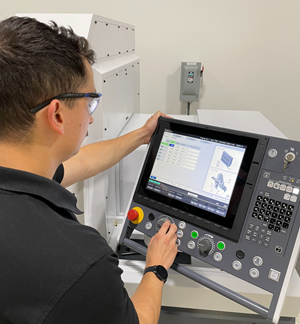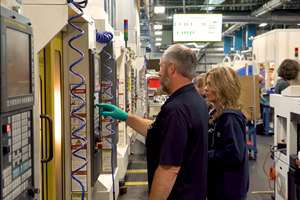The DMDII Is a Showcase for Digital Manufacturing
A tour of Siemens’ Digital Manufacturing and Design Innovation Institute in Chicago revealed the potential scope of the “digital enterprise” concept.
Share




A recent press conference sponsored by Siemens gave me an opportunity to visit and tour the Digital Manufacturing and Design Innovation Institute (DMDII) on Goose Island in downtown Chicago (and no, I didn’t see the famous brewery). DMDII was an appropriate setting for the press conference, which focused on how machine tool users and machine tool builders can benefit from digitalization within the scope of the company’s overarching “digital enterprise” concept, because the digital enterprise is very much the focus of DMDII as well.
The DMDII is a Chicago consortium led by UILabs and is part of Manufacturing USA, which is described as a “network of institutes in which manufacturers of all sizes partner with academia and government to share manufacturing technology and workforce challenges to build a robust, sustainable R&D infrastructure.”
As a major sponsor of DMDII, Siemens has a substantial presence in the institute’s workspace, a presence that reinforces the ongoing effort to develop digital technology and the ongoing effort to promote the adoption of this technology. Here, the company is showcasing the Siemens Digital Enterprise, a walk-through, hands-on series of interactive exhibit stations that show the benefits of digitalization at each of the major steps in the manufacturing process.
As visitors move from station to station (90 minutes would be sufficient to explore all of the stations thoroughly), it is compellingly clear how a virtual data model (the digital twin) can be created and handed off seamlessly from task to task to unify, automate and streamline manufacturing steps. No PowerPoint presentation can quite replicate the flow and continuity of data that is the hallmark of the digital enterprise that is emerging. Siemens’ exhibit makes this real.
Other DMDII partners are using its space in various other ways. McKinsey & Company hosts its North American Digital Capability Center here as an experiential learning facility to give manufacturers an opportunity to explore digital applications for use by real operators with real products. It is equipped with resources for workpiece preparation and processing, as well as stations for measuring, finishing and packaging products. It is more than a training center, because participants can first “try on” the aspects of the digitally driven production line that most suit their needs, from augmented reality to artificial intelligence and collaborative robots in an environment of lean manufacturing. In-depth training can follow.
Stanley Black & Decker has a similar simulation of a production line that tests and demonstrates how equipment and devices from a mix of suppliers can be integrated in a plug-and-play basis of interoperability. A notable benefit of these experiments is a practical approach to protecting data integrity and minimizing risk of cyberattacks.
Several other partners have installed machine tools in the facility for testing software, product designs and networking strategies. Some of the machine tool builders represented at DMDII include DMG MORI, Haas, Hyundai Wia and Bulova, among others.
To be clear, DMDII is much more than a place. It is a hub for activities such as organizing and coordinating research projects. It conducts workshops on key focus areas related to the digital factory to identify the projects in which its manufacturing partners are most interested in. You can sample and judge the quality and relevance of such projects by looking at its Partners in Connection report, “The Digital Workforce Succession in Manufacturing.” One development from this project is the Digital Manufacturing and Design Roles Taxonomy. Fancy words, perhaps, but the taxonomy has real-world implications. It outlines the changes effecting jobs in a digital factory, why these jobs are changing, how they are changing (new roles, new skills), and how these jobs will continue to change. This last point about how jobs will change is critical. This is the meaning of “succession” in the report title. I’d like to define succession in this context as the career growth path that job holders will have the opportunity to follow as the factories employing them transition into a digital enterprise. We are looking at the future of the manufacturing workforce here.
In short, DMDII functions as an instrument of change as well as a director of that change. Its success will be measured by the adoption of change by U.S. manufacturing companies.
Related Content
Swiss-Type Control Uses CNC Data to Improve Efficiency
Advanced controls for Swiss-type CNC lathes uses machine data to prevent tool collisions, saving setup time and scrap costs.
Read MoreShop Quotes Smarter, Works Harder with Machine Monitoring
Temco first installed MT-LINKi to optimize quoting. Now, the software helps the shop optimize its machines — and machine purchases.
Read MoreHow this Job Shop Grew Capacity Without Expanding Footprint
This shop relies on digital solutions to grow their manufacturing business. With this approach, W.A. Pfeiffer has achieved seamless end-to-end connectivity, shorter lead times and increased throughput.
Read MoreFour Questions (& Answers) About Data-Driven Process Improvement at CNC Job Shops
How can shops can make informed decisions using data-driven feedback to improve shopfloor efficiency and profitability? And how will these technologies differ between high- and low-volume production?
Read MoreRead Next
5 Rules of Thumb for Buying CNC Machine Tools
Use these tips to carefully plan your machine tool purchases and to avoid regretting your decision later.
Read MoreSetting Up the Building Blocks for a Digital Factory
Woodward Inc. spent over a year developing an API to connect machines to its digital factory. Caron Engineering’s MiConnect has cut most of this process while also granting the shop greater access to machine information.
Read MoreRegistration Now Open for the Precision Machining Technology Show (PMTS) 2025
The precision machining industry’s premier event returns to Cleveland, OH, April 1-3.
Read More































